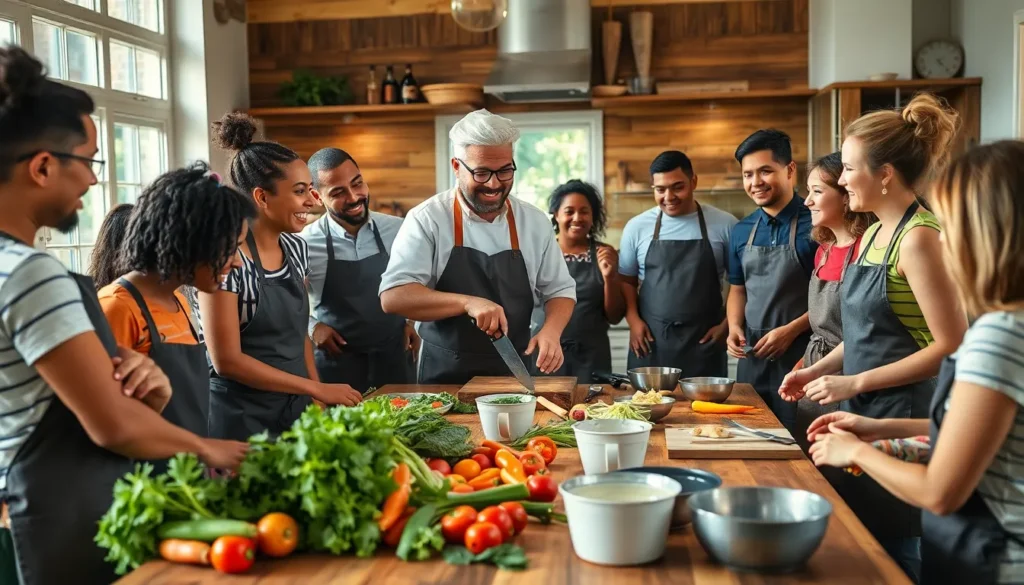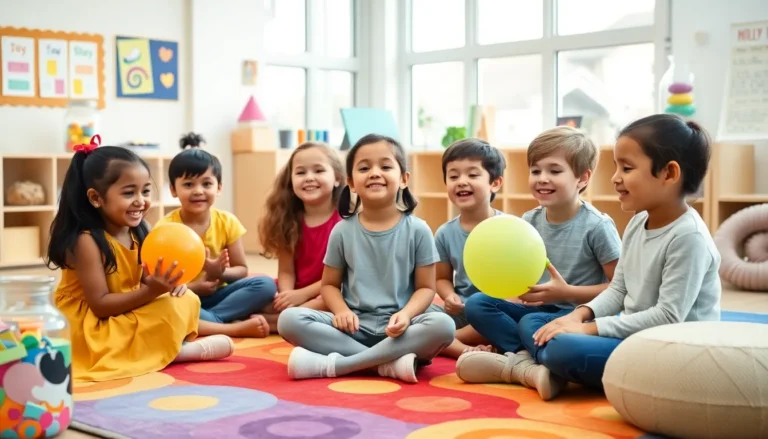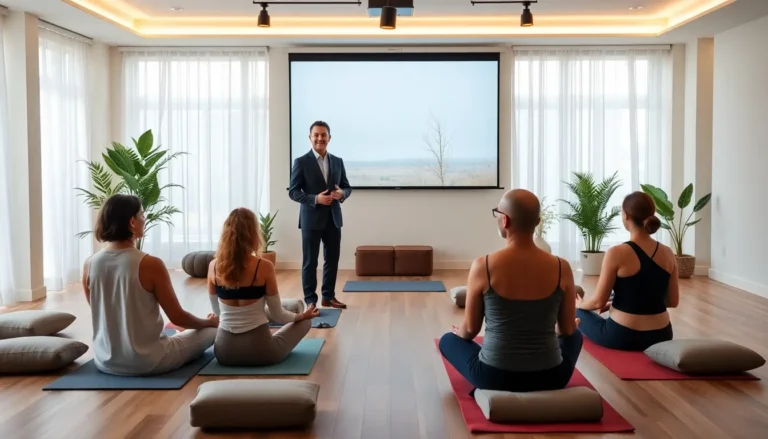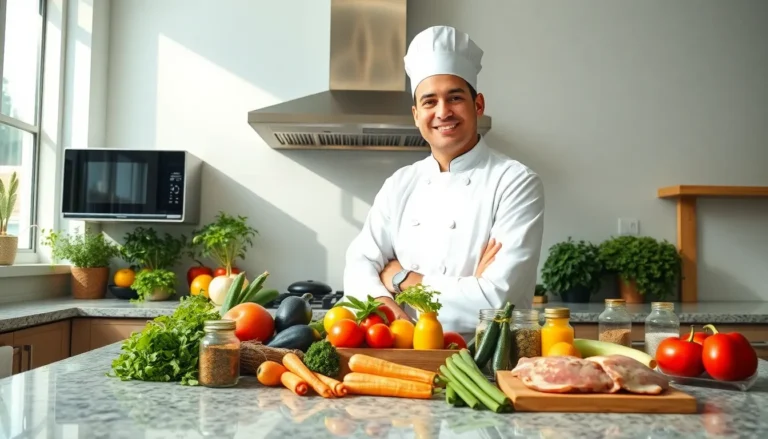Table of Contents
ToggleImagine stepping into a kitchen where the aroma of sizzling garlic and fresh herbs dances in the air, and laughter fills the room. Cooking workshops offer more than just a chance to whip up a delicious meal; they’re a culinary adventure waiting to unfold. Whether you’re a kitchen novice or a seasoned chef, these workshops turn cooking into a delightful experience, complete with new skills and a side of fun.
Overview of Cooking Workshops
Cooking workshops offer engaging experiences for participants at any skill level. These immersive sessions focus on hands-on learning, enabling individuals to explore various cuisines while honing their culinary abilities. Attendees encounter a supportive environment where expert chefs provide guidance, creating an ideal setting to experiment with new techniques and flavors.
Interactive activities often include knife skills, plating techniques, and ingredient selection, fostering confidence among participants. Workshops can range from short, one-day events to more extensive courses spanning several weeks, catering to diverse interests. Recipes may vary, allowing for unique culinary explorations and the chance to delve into different cultural dishes.
Networking opportunities arise, enabling participants to share their experiences and tips. Many cooking workshops also emphasize teamwork, encouraging collaboration as individuals work together to create a meal. This communal approach often enhances the overall experience and cultivates lasting connections.
Expected outcomes of these workshops include increased culinary knowledge and practical skills. Participants often leave with not only new recipes but also enhanced creativity and an understanding of flavor profiles. Establishing a culinary repertoire becomes more enjoyable in this hands-on atmosphere.
Cooking workshops serve as an excellent option for team-building events or private gatherings, bringing friends and family together in a fun atmosphere. They provide a platform for individuals to enhance their cooking prowess while enjoying shared passion and laughter around the kitchen.
Benefits of Attending Cooking Workshops
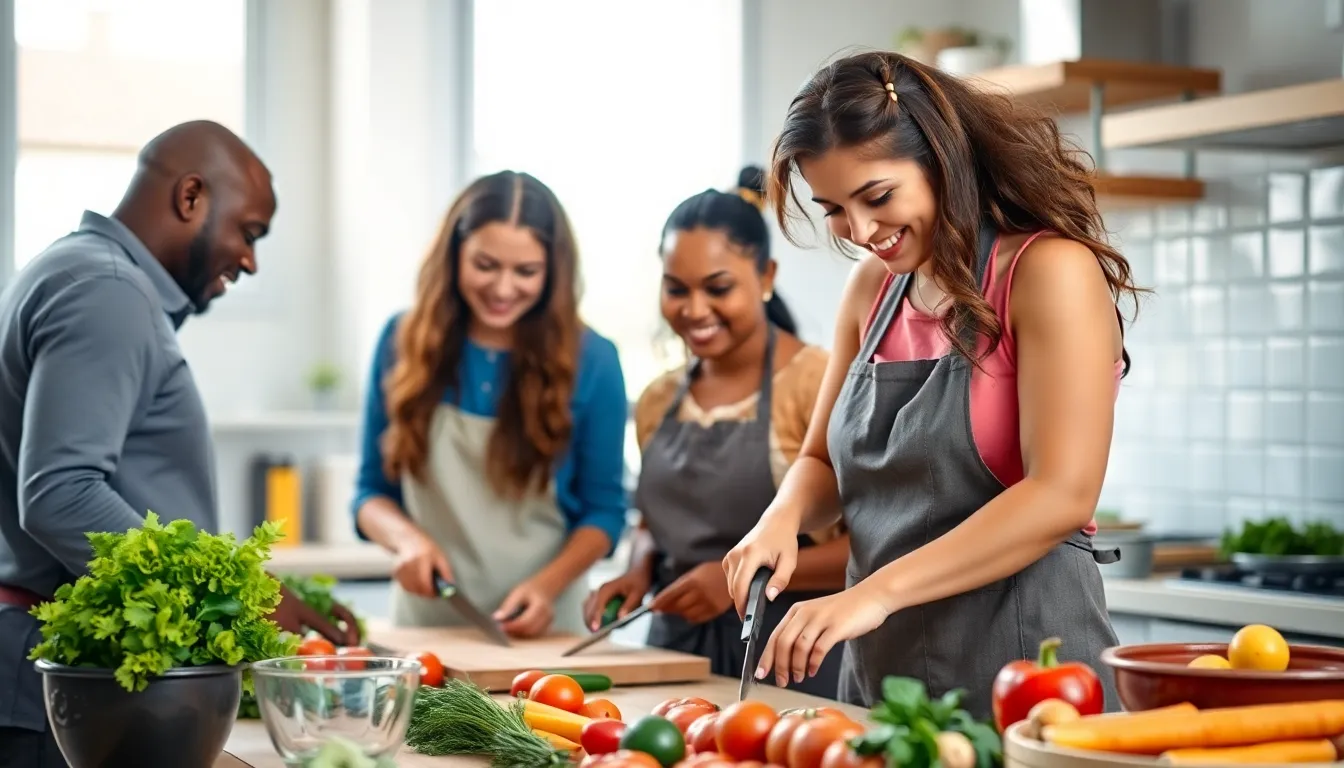
Attending cooking workshops enhances culinary skills and offers social opportunities. Participants gain practical experiences while connecting with others.
Skill Development
Skill development occurs through hands-on activities. Participants learn essential techniques like chopping, sautéing, and baking. Expert chefs provide personalized guidance, ensuring improvement in cooking abilities. Workshops often cater to various skill levels, allowing beginners to grasp fundamentals and experienced cooks to refine their techniques. Engaging in different cuisines fosters versatility in cooking styles. Additionally, attendees receive tips on ingredient selection and food presentation, enhancing overall culinary knowledge. Increased confidence grows through practice, encouraging experimentation with flavors and recipes.
Social Interaction
Social interaction forms a significant aspect of cooking workshops. Participants bond over shared experiences while cooking together. Teamwork plays a vital role in recipe preparation, promoting collaboration. Making new connections occurs naturally as group dynamics blend individuals from various backgrounds. Engaging conversations arise, making interactions enjoyable and informative. Workshops often create a relaxed environment where friendships develop over a shared love of food. As participants work towards a common goal of culinary mastery, lasting memories and networks form, enriching the overall experience.
Types of Cooking Workshops
Cooking workshops come in various formats, each offering unique experiences. Participants can choose workshops that best fit their interests and skill levels.
Themed Workshops
Themed workshops focus on specific cuisines or culinary trends. Examples include Italian pasta nights, Indian street food, or baking French pastries. Atmospheres in these sessions are lively, often filled with cultural decor and music. Participants explore traditional recipes and cooking techniques associated with these themes. Engaging with these focused topics deepens culinary knowledge and fosters creativity. The festive ambiance encourages collaboration, allowing individuals to share insights and tips.
Hands-On Workshops
Hands-on workshops emphasize active learning and practical skill development. Attendees engage directly in preparing dishes under the guidance of experienced chefs. Lessons cover vital techniques like chopping, sautéing, and baking through real-time practice. Each session promotes interaction through shared tasks, enhancing team dynamics among participants. Immediate feedback helps refine skills, boosting confidence in the kitchen. These workshops provide a platform to build mastery over essential cooking techniques while enjoying a collaborative environment.
What to Expect in a Cooking Workshop
Participants can expect a vibrant atmosphere filled with enticing aromas and laughter. Engaging hands-on experiences await them as they explore various cuisines while honing their culinary skills. Guidance from expert chefs enhances the learning experience, allowing individuals to gain confidence in the kitchen.
Activities commonly include knife skills, plating techniques, and ingredient selection. Each session covers essential cooking techniques such as chopping, sautéing, and baking. Personalized feedback from chefs ensures that attendees improve their abilities, whether they’re beginners or experienced cooks.
Collaborating with others presents an enjoyable aspect of cooking workshops. Participants work together in recipe preparation, which fosters connections among diverse individuals. This teamwork stimulates informative conversations that enrich the overall experience.
Themed workshops bring excitement through specific cuisines or culinary trends. Italian pasta nights or Indian street food sessions illustrate the lively atmosphere created by cultural decor and music. Engaging with traditional recipes allows participants to deepen their culinary knowledge and creativity.
Hands-on workshops prioritize active learning, giving attendees the opportunity to prepare dishes with direct guidance. Interaction among participants promotes teamwork and provides immediate feedback, enabling skill refinement and boosting confidence. Each format enhances the culinary journey and encourages mastery of essential cooking techniques.
Overall, cooking workshops create memorable experiences, making them excellent choices for team-building events or private gatherings.
Tips for Choosing the Right Workshop
Assess personal goals before selecting a workshop. Identify whether the intention is to learn basic skills or advance existing culinary knowledge. Researching the chef’s expertise helps match the workshop’s focus with personal cooking interests.
Consider the workshop format. Hands-on sessions allow for direct engagement, which is crucial for skill development. Themed workshops often create lively environments, immersing participants in specific culinary traditions.
Evaluate group size as well. Smaller groups foster more interaction and personalized feedback, enhancing the learning experience. Larger workshops may offer diverse perspectives but might limit individual attention.
Check the workshop duration. Shorter sessions often cover essentials quickly, while longer ones dive deeper into techniques and cuisine. Confirming the schedule aligns with personal availability ensures a stress-free experience.
Look into pricing options. Costs vary depending on the workshop’s length and complexity. Some workshops include all materials, while others require additional purchases for ingredients or equipment. This information impacts budgeting decisions.
Seek reviews from past participants. Honest feedback provides insights into the workshop’s quality and instructor effectiveness. Positive experiences often indicate a worthwhile investment in culinary education.
Explore locations as well. Proximity may influence attendance, with local options providing convenience. Some workshops may happen online, which offers flexibility and access to a broader range of instructors.
Ultimately, understanding personal preferences and goals aids in selecting the perfect cooking workshop. Finding a suitable environment promotes successful learning, enjoyable interactions, and the development of lasting culinary skills.
Cooking workshops offer a unique blend of skill development and social interaction. Participants not only learn essential culinary techniques but also create lasting memories with fellow food enthusiasts. The vibrant atmosphere fosters collaboration and friendship, enriching the overall experience.
Choosing the right workshop can significantly enhance one’s culinary journey. By considering personal goals and preferences, individuals can find a session that aligns with their interests. Whether it’s mastering basic skills or exploring new cuisines, cooking workshops provide an engaging platform for growth and creativity in the kitchen. Embracing these culinary adventures can lead to newfound confidence and a deeper appreciation for the art of cooking.

